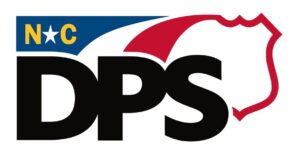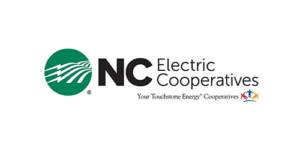CARY – The Research Triangle Cleantech Cluster on Wednesday night named its annual Cleantech Innovation Awards winners. Here’s the complete list:
Lifetime Achievement Award
Gary Rackliffe


As the Vice President for Market Development for Market Development and Innovation at Hitachi Energy, Gary focuses on the energy transition, ongoing grid modernization, and the utility digital transformation. Gary is an industry leader and serves as the expert advisor to utilities, government agencies, industry boards and industry associations on the best practices and innovations for clean energy, grid modernization, smart grids, and digitalization.
Gary never says no when requested to support or lead in community, service, or business opportunities and is continuously looking for new opportunities to develop cleaner and more sustainable solutions locally and throughout the industry.
We at RTCC are deeply grateful to Gary for his role as a leader on our own Board of Directors. In his many years of service to RTCC, including as Chair, he has advocated for grid modernization, university engagement, regional economic development, and state and federal investments in our clean energy transition.
Cleantech Champion
Paul Braese

As the Energy Manager for the NC Department of Public Safety, Paul oversees all utility consumption and leads initiatives for water and energy conservation. Paul has set the gold standard for advancing conservation and efficiency efforts in state government. Through his leadership, the state has reduced its energy and water consumption and is saving millions of dollars annually. Utilizing Electric Utility Credit and Opt-Out rebates, Paul has led an energy conservation program that has generated a cost avoidance of nearly $6M over four years, with all savings being reinvested into further efficiency efforts. Paul has saved hundreds of thousands of gallons of water through a leak identification and repair program, adding up to nearly $500,000 in recovered bill credits and $200,000 in annual cost avoidance. Throughout his efforts, Paul has hired and trained college interns and provided invaluable exposure to energy conservation efforts at NCDPS.
Cleantech Entrepreneur Award
Daniel Kauffman

Founded in 2017 by Daniel Kauffman, Enpira is a Durham, NC based software company providing utility data solutions to cities, counties, school districts, efficiency programs, and cooperative utilities across North Carolina and around the country. Enpira transforms utility data into actionable insights that enable clients to save energy, reduce peak demand, engage customers and stakeholders, and enhance community sustainability. Under Daniel’s leadership, Enpira has partnered with organizations to help identify efficiency opportunities with the biggest impacts, show improvement, save staff time, and help manage facilities more efficiently.
Cleantech Research Innovation
Judy Riffle & Sue Mecham

Dr. Judy Riffle and Dr. Sue Mecham, a mother-daughter team, founded NALA Membranes and have succeeded in developing a scalable manufacturing process for the development of a new class of membranes based on new polymers. NALA’s membrane technology offers a unique solution to the problem of biofouling in reverse osmosis systems that will reduce energy, chemical cleaning, and downtime, plus extend membrane lifetimes to significantly reduce the lifecycle costs of the reverse osmosis systems, making them more sustainable and accessible. The NALA commercialization team is targeting the rapidly growing wastewater recycle and reuse market for early adopters.
Cleantech Talent Development
Successful Training and Effective Industry Partnerships for Growing Regional Opportunities in Workforce To Harness (STEPs4GROWTH)

The North Carolina A&T State University’s STEPs4GROWTH project, funded by a $23.7 million American Rescue Plan Good Jobs Challenge, is an equitable workforce development project. STEPs4GROWTH will provide quality, demand-driven, hands-on training to students from high schools, community colleges, and universities in different areas of the clean energy sector. With a focus on equity, the program will use mobile training units in 16 economically distressed North Carolina counties to remove barriers to access and deliver training where workers are. Additionally, the project will serve as a national training model that will create a diverse talent pipeline to support the economy. More than 40 employers have committed to hiring 3,000 STEPs4GROWTH trainees over four years and an additional 1,500 trainees every year thereafter.
Diversity Equity and Inclusion in Cleantech
PoleVolt

Cleantech Impact: Energy
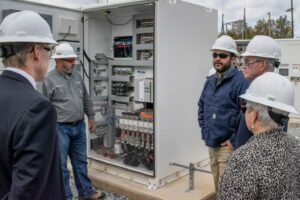
FlexGen’s installation of cutting-edge battery storage technology in 10 communities within North Carolina’s Electric Cooperatives will provide 40 megawatts of power, which will be charged when demand for electricity is low and discharged during moments of peak demand, increasing reliability and providing cost savings to co-op members. FlexGen’s HybridOS™ technology platform was developed in Durham, NC by a team of engineers to manage advanced energy storage systems and fast-response services. The integration software is hardware agnostic, allowing any energy storage system project to evolve as grid requirements change.
Cleantech Impact: Transportation
Native Electric

The Eastern Band of Cherokee Indians (EBCI) has shown exceptional leadership in pursuit of cleaner electrified transportation. In 2017, EBCI’s Office of Natural Resources applied for and was awarded the first electric school bus in North Carolina, funded by the NC Department of Environmental Quality Division of Air Quality from VW Settlement funds. EBCI and Cherokee Boys Club were encouraged and decided to apply for a competitive EPA grant through the Diesel Emissions Reduction Act (DERA) program. They were awarded funds to support four new electric school buses, which Duke Energy has supplemented with funds for equipment to charge the buses. In 2021, the EBCI Tribal Council ratified a target of 50% of vehicles being electric vehicles or hybrids. They have gone on to pursue 14 more electric school buses through EPA’s Clean School Bus lottery program. They have also hosted a School Bus Drag Race to showcase the performance of their electric school bus in competition with a diesel school bus.
Cleantech Impact: Water
Chatham Park Water Recovery Center
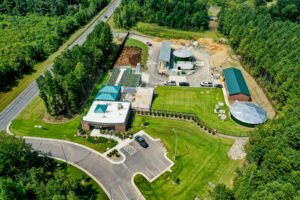
FlexGen’s installation of cutting-edge battery storage technology in 10 communities within North Carolina’s Electric Cooperatives will provide 40 megawatts of power, which will be charged when demand for electricity is low and discharged during moments of peak demand, increasing reliability and providing cost savings to co-op members. FlexGen’s HybridOS™ technology platform was developed in Durham, NC by a team of engineers to manage advanced energy storage systems and fast-response services. The integration software is hardware agnostic, allowing any energy storage system project to evolve as grid requirements change.
Cleantech Impact: Local Government
Guaranteed Energy Savings Contract
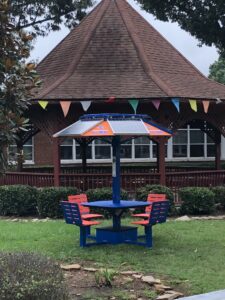
Lexington City Schools utilized the Guaranteed Energy Savings Contract statute to create over $5 million in guaranteed energy efficiency savings over the next 19 years, including projects such as replacing the chillers, cooling towers, and boilers at schools across their district. Dr. Anitra Wells, Superintendent of Lexington City Schools, had a vision to tie this district-wide project with their curriculum. A district-wide volt patrol program is being implemented as a behavioral reward for students that teaches them energy savings strategies that they can also take home to their families. Additionally, Schneider Electric provided a solar picnic table for the high school courtyard to help students charge their devices.

